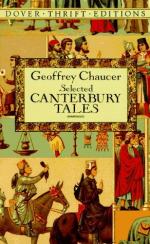|
This section contains 6,134 words (approx. 16 pages at 400 words per page) |

|
In the following essay, Neuse explores the characters of the Knight and Theseus, and calls the "Knight's Tale" a "testimony to the insufficiency of human wisdom at the same time that it transcends it."
In recent years there seems to have been general agreement that the "Knight's Tale" is a "philosophical romance" which raises the problem of an apparently unjust and disorderly universe. By this reading the "Tale" emerges as a philosophic theodicy culminating in Theseus' speech on cosmic order.
The latter implicitly denies the final reality or rule of an arbitrary Fortune, but at the same time stoically accepts the inscrutable workings "in this wrecched world adoun" of an eternal cause. The "Tale" is thus seen as the Knight'sand Theseus' somewhat wistful "consolation of philosophy," the affirmation of an ultimate order that actual experience seems, often sadly, to deny.
Quite recently a study has suggested...
|
This section contains 6,134 words (approx. 16 pages at 400 words per page) |

|




